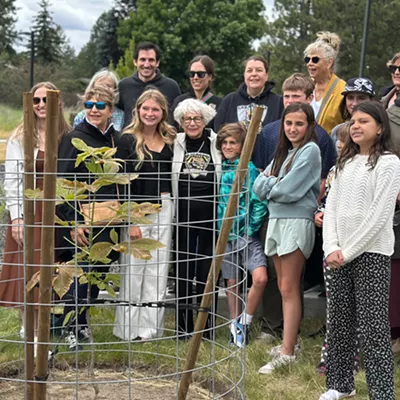The car bearing Spokane County Prosecutor Steve Tucker crunched over the gravel of the Plant Farm parking lot last Friday morning, not far from the spot where a sheriff’s deputy fired one fatal bullet in an encounter with the property’s armed owner last summer.
The August shooting created a firestorm of media coverage and community uproar over the fact that nurseryman and Baptist church pastor Wayne Scott Creach, 74, could be killed while checking on a suspicious car an unmarked police cruiser on his own property.
Creach’s death turned out to be the first in a cluster of seven shootings by local police agencies, five of them fatal. The latest was less than two weeks ago. (See p. 16.)
Tucker, looking more broad-shouldered than usual in a black leather duster and cowboy boots, was stone-faced as he walked past the spot where Creach died. He strode on, heading for the front door of the adjoining house where Creach’s widow, Imogene, and sons Alan and Ernie were waiting around the dining table to hear Tucker’s official ruling on whether murder charges would be filed against the officer.
The family had long expected Tucker to find that Deputy Brian Hirzel was justified in shooting Creach, who appeared to be drawing a gun on the officer during a tense encounter late at night.
“They had a lot of questions. They are not happy with the result. They wanted to see some charges out of this,” Tucker said when he left the house nearly an hour later.
“It was no surprise,” said a composed Imogene Creach, sitting at the head of the table.
Alan Creach added, “[Tucker] had told us early on that he had no plans to file charges, and now he’s finally come out and issued the statement that there will be no charges.”
The meeting was polite, both sides said, but difficult. “It’s tough to do this I haven’t had too much sleep the last couple of nights but I felt it was important for me to tell them in person before they heard it in the news or on TV,” Tucker said.
Despite the lack of surprise over Tucker’s ruling, the Creaches appeared deflated in its aftermath. They are still grieving, grappling with the sudden loss of Scott Creach, and searching for answers. They stopped short of saying they will sue the county or Hirzel.
“We started early on to perform an investigation,” Alan Creach says. “It’s expensive, but I don’t have any intention of just stopping. Once we’ve gathered all the information that can be gathered we’ll sit down and make an educated decision on how to proceed.”
An attorney they have hired to help with the investigation, former deputy prosecutor Richard Wahl, was also in the house for the meeting with Tucker.
Tucker has six more of these cases headed for his desk. In each incident, officers faced armed citizens who appeared to be threatening the lives of police or other people.
The takeaway from Friday’s announcement, Tucker says: Obey the officer and put the weapon down. You can always argue later.
INTERNAL REVIEW
The completion of the criminal review does not end the matter for Hirzel, who has been assigned to desk work since the shooting. Sheriff Ozzie Knezovich this week also began an internal review of the incident.
The sheriff has named 12 officers to a deadly-force review board and has also asked the department’s citizen review panel to monitor the process.
“I told them I want this to be complete, thorough and transparent,” Knezovich says.
He says the review board will ask the Spokane Police Department, which investigated the fatal shooting, for all its information. They will ask the Creach family for any unanswered questions.
Then, Knezovich says, the board will “go through policies, practices, rules, regulations, training everything.”
The goal, he says, “is to answer how did we get to where we ended up that night?” Fatal shootings, justified or not, take a toll, Knezovich says. “I’m telling you that is the last resort. If that trigger is pulled, there was nothing else to do. Our people understand this can never be taken back once that bullet leaves the weapon it cannot be taken back,” Knezovich says.
He pulls out a fat, black binder full of news articles and thumps it down onto the table. He jabs at it with a finger. “There are 89 stories in here.”
Stories, Knezovich contends, that leave the impression his officers are prone to violence.
“Since 2004, we have had a half a million calls for service. We have used force 1,000 times. Out of those 1,000, we’ve used deadly force, I believe it is nine times and not all nine died,” the sheriff says. “Does that not speak to the fact that our guys are literally talking people down? You never hear about the individual who has the gun and drops it, but that happens tons of times.”
THE CIVILIAN QUESTION
According to Hirzel’s statements to Spokane Police detectives, he had backed his dark blue, unmarked patrol car into the Plant Farm parking lot around 11 pm on Aug. 25 as a convenient spot to watch a house down the street that had requested some extra eyes.
He was finishing paperwork from an earlier traffic stop when he caught a light from the corner of his eye and looked up to see a shirtless man approaching with a flashlight and a handgun.
He became alarmed, Hirzel says, especially when the man did not respond to commands to stop or identify himself.
Most of the deadly-force incidents that have plagued local law enforcement agencies in recent months have involved people who have had criminal records, or were involved in a call to police about a fight or domestic violence, or who were reported to have mental health issues.
Not Creach. He was an elder in his church, deeply involved in helping others.
From a humble beginning with a flat of tomato plants, he built the Plant Farm over the years into a thriving, 26-acre nursery.
Hirzel has said Creach advanced all the way to the driver’s door of the patrol car, against the glare of the spotlight, before stepping back and putting the gun, a .45-caliber, in the back waistband of his pants.
The tense encounter seemed to be de-escalating. In his interviews with detectives, Hirzel never says Creach identified himself as the owner of the property, but instead repeatedly refused to comply with the deputy’s commands to get on the ground.
When the older man began to draw the gun from his waistband, Hirzel says he felt his own life was in danger, and he shot from a few feet away.
Could not the deputy have bear-hugged Creach? Tripped him?
Kneed him? Was shooting the only choice?
“Yes, it is the only option,” Tucker says. “Are you going to wrestle with somebody with a gun? I’m not going to, and I wrestled in college. That gun is coming out. In about a half-second it will be turned on you. Officers are not obligated to take the first bullet.”
Knezovich agrees, saying officers faced with a deadly threat don’t wait to be shot.
“What options do I have at that point, alone, in the dark, no one around me and he draws on me?”
TENSE OUT THERE
The recent spike in officerinvolved shootings locally and statewide comes in a larger context of violent encounters with police nationally.
Eleven police officers were shot just last weekend, including two in western Washington.
Tucker and Knezovich point out a steep increase in police fatalities last year 162 killed in the line of duty in 2010, up from 117 in 2009.
Locally, people have questioned whether officers have become overly sensitized to potential threats after the ambush-avoidance training they’ve received in the wake of the late-2009 killing of Lakewood, Wash., officers ambushed in a coffee shop.
Shortly before his encounter with Creach, Hirzel had undergone a training scenario in which he was ambushed in a patrol car.
“Lakewood was a tragic event, but we’ve had Lakewoods before,” Knezovich says. “What it is, quite frankly, is there’s an extreme amount of tension out there. People are angry. People are fearful. They are angry they’ve lost their job, or they are fearful they are going to lose their job. Domestic violence is up. Take a look at the genesis of many of these shootings, and it was domestic violence.”
The internal review, he says, will not just focus on Hirzel’s actions. If the training and policies of the agency contributed to the fatal encounter, Knezovich says, they will be changed as well.
Spokane civil rights attorney Brean Beggs urges greater emphasis on de-escalation techniques.
“When someone is shot, it is horrible for the victim, it is horrible for their families but it is also horrible for the officer,” Beggs says. “They live with that for the rest of their lives. They are injured when they kill somebody. We are not doing them any favors if we train them only half-way.”
Tucker says he spoke with Hirzel on Jan. 18 to inform him there would be no criminal charges.
According to Tucker, the deputy said, “When I found out there wasn’t a bullet in the chamber [of Creach’s gun], that made me feel terrible. Then, I found out he owned the property and that made me feel worse. And then I found out he’s a pastor.”





















